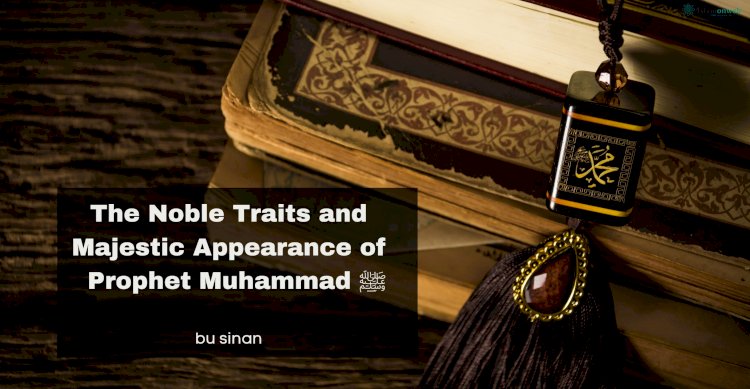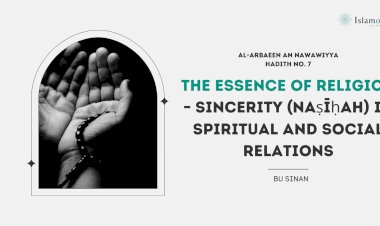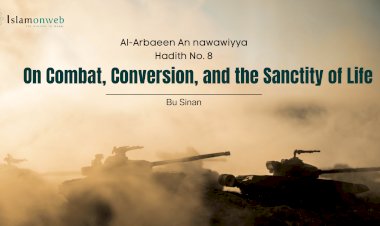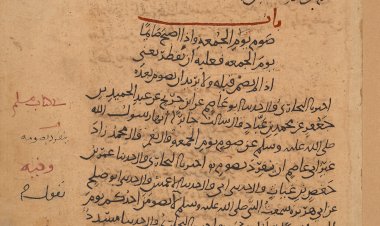The Noble Traits and Majestic Appearance of Prophet Muhammad ﷺ: A Detailed Narration
In the name of Allah, the Most Gracious, the Most Merciful. All praise belongs to Allah, and may peace and blessings be upon His beloved Prophet Muhammad ﷺ, the best of creation, whose character, conduct, and physical beauty are unparalleled.
The following hadith, reported by Al-Hasan and Al-Husayn (may Allah be pleased with them), the grandsons of the Prophet ﷺ, is one of the most detailed and cherished descriptions of the Prophet's noble qualities. Al-Hasan narrates that he asked his maternal uncle, Hind ibn Abi Hala (may Allah be pleased with him), who was known for his descriptive eloquence, to describe the Prophet's ﷺ physical appearance and conduct so that he could always keep this vivid image in his heart.
Hind ibn Abi Hala was the son of Khadijah (may Allah be pleased with her), the beloved wife of the Prophet from her previous marriage, making him the Prophet's stepson. Hind was renowned for his ability to describe the Prophet vividly, and it is through his detailed narration that we have one of the most comprehensive descriptions of the physical appearance and noble character of the Prophet ﷺ.
In the second part of the hadith, Sayyidna Al-Hasan narrates from his sibling Sayyidna Al-Husayn what he has inquired from their father, Ali ibn Abi Talib (may Allah be pleased with him), to further expand on the Prophet's daily habits, manners, and interactions with others.
This precious narration provides a comprehensive portrayal of the Prophet Muhammad ﷺ, detailing not only his physical features but also his demeanour in public and private life. It serves as an invaluable source for those who wish to gain a deeper understanding of the Prophet's (peace be upon him) personality, his balance of kindness, humility, and wisdom, and his unparalleled role as the best example for all of humanity.
Imam Al-Bayhaqi reports in "Shu'ab al-Iman" from Al-Hasan ibn Ali (may Allah be pleased with him)
Hasan said: "I asked my maternal uncle, Hind ibn Abi Hala, who was skilled in describing the characteristics of the Prophet ﷺ, as I longed for him to describe something of him that I could hold onto. He said...
"The Messenger of Allah ﷺ was majestic and dignified. His face shone like the full moon. He was slightly taller than average, but not too tall, and shorter than those with a towering height. His head was large, and his hair was slightly wavy. If his hair parted naturally, he would leave it, otherwise, he would not seek to part it. His hair reached his earlobes when it was plentiful. He had a bright complexion and a wide forehead. His eyebrows were long and arched but not connected. Between them was a vein that swelled when he was angry. His nose was prominent with a glow above it, making one who did not carefully examine him think that it was slightly arched.
His beard was thick, and his cheeks were smooth. His mouth was wide, and his teeth were bright, perfectly aligned, with slight spacing between them. A fine line of hair ran from his chest to his navel. His neck was as smooth and radiant as a statue made of pure silver. He had a balanced build and was firmly structured, with a chest and stomach in harmony. His chest was broad, and the space between his shoulders was vast. His joints were large, and his body glistened where it was bare. A line of hair extended from his upper chest to his navel, but his chest and belly were otherwise hairless. His arms, shoulders, and upper chest were hairy. His forearms were long, his palms wide, and his arms and legs straight and smooth. His hand and feet were thick and firm, fingers lean, soles arched, feet smooth, and water would slide off them as though it couldn't find a place to settle.
When he moved, he moved with determination. He walked with a slight forward lean, and his pace was calm and measured. His strides were wide, and when he walked, it seemed as though he was descending from a slope. When he turned, he would turn his whole body. He lowered his gaze. His gaze was more often downward than upward. Most of his looking was through observation. He would walk behind his companions and be the first to greet anyone he met with peace."
When I asked about his manner of speaking, Hind said: 'The Prophet ﷺ was often thoughtful, always contemplating. He had no leisure, and he did not speak without necessity. He was silent for long stretches, and when he spoke, he opened and concluded with full sentences. His words were comprehensive and precise, neither excessive nor insufficient. He was gentle, not harsh nor belittling. He magnified even small blessings and never criticized anything. He did not condemn any food nor excessively praise it.
Worldly matters did not anger him, but when justice was compromised, nothing could stand in his way. He never got angry for himself nor sought revenge for personal wrongs. When he pointed, he used his whole hand, and when surprised, he would turn his hand. When he spoke, he connected his hand movements, sometimes striking the inside of his right palm with his left thumb. When angered, he would turn away, and when pleased, he would lower his gaze. His laughter was mostly a smile, revealing teeth as bright as hailstones.'"
Al-Hasan continues: "Al-Husayn (his brother) kept this information hidden for a time, and then I told him about it, only to find that he had already preceded me in asking about it. He had asked just as I had, and I found that he had already asked his father about the Prophet's ﷺ habits of entering, sitting, and leaving, leaving out nothing.
Al-Husayn said: I asked my father (Ali bin Abi Talib) about the Prophet's ﷺ manner of entering his home, and he said: 'The Prophet's ﷺ entry was permitted for him, and when he entered his home, he divided his time into three parts: one part for Allah, one part for his family, and one part for himself. Then he divided his own portion between himself and the people, responding to both the close ones and general, without withholding anything from them.'
The Prophet's ﷺ manner with the people in his share of time was to give preference to those of virtue and divide his attention according to their merit in religion. Some had one need, others had two, and some had many. He would occupy himself with them, keeping them engaged in matters that would benefit them and the community, asking about them and informing them of what was beneficial. He would say to them: 'Let those present convey to those absent and inform me of the needs of those who cannot inform me themselves. For whoever conveys the need of someone who cannot reach authority, Allah will make their feet firm on the Day of Judgment.' Nothing else was mentioned to him except this, and no one else was accepted in this matter. They would enter as seekers of guidance and would not depart without having tasted something (of benefit), and they would leave as guides themselves.'"
He said: "I asked him about the Prophet's ﷺ conduct when he went out and how he acted in public. He replied: 'The Messenger of Allah ﷺ would guard his tongue from anything unnecessary and would only speak on matters that concerned them (his companions). He would unite them and not cause division among them, or as he said, would not repel them' (one of the reporters was unsure of the wording). He honoured the nobles of every tribe and appointed them as their leaders. He was cautious of people but without withholding his cheerful expression or good character from anyone.
He would inquire after his companions and ask people about the conditions of others. He praised what was good and strengthened it and condemned what was bad and weakened it. He was balanced in his affairs, without contradiction. He was always vigilant, fearing that his companions might become negligent or weary. For every situation, he had appropriate preparations. He neither fell short of the truth nor exceeded it. Those closest to him were the best among them, and the most virtuous in his eyes were those who gave the most sincere advice. The ones with the highest standing with him were those who were most supportive and cooperative.'"
He said: "I asked him about the Prophet's ﷺ gatherings, and he said: 'The Messenger of Allah (peace be upon him) would not sit or rise without remembering Allah. He did not reserve specific places for himself and forbade others from doing so. When he arrived at a gathering, he would sit wherever the sitting ends and encourage others to do the same. He would give each of his companions their due attention, and no one sitting with him would feel that another person was more honoured than him.
Whoever sat with him or came to him with a need, he would patiently attend to them until they were the ones to leave. Whoever asked him for something, he would either grant it or offer kind words. His generosity and good character encompassed everyone, so they saw him as a father, and all were equal before him in their right. His gatherings were those of forbearance, modesty, patience, and trustworthiness. Voices were not raised, nor were people's dignities violated, nor were mistakes magnified. They were equal in their dealings, only distinguishing one another through piety. They were humble, honouring the elderly and showing mercy to the young. They would give preference to those in need and look after or protect strangers.'"
He said: "I asked him about the Prophet's ﷺ conduct during his gatherings, and he replied: 'The Messenger of Allah (peace be upon him) was always cheerful, easy-going, and gentle. He was neither harsh nor rough, loud or vulgar, critical or excessively praising. He would overlook things he did not like without making others lose hope or feel rejected.
He refrained from three things: argumentation, excessive talking, and matters that did not concern him. He also refrained from three things concerning others: he would not criticize or shame anyone, nor would he seek out people's faults. He only spoke on matters from which he hoped to gain a reward. When he spoke, those sitting with him would lower their heads as though birds were perched on them. When he was silent, they would speak, but they would not quarrel in his presence. When one of them spoke, the others would attentively listen until he finished.
Their conversation with him was like the conversation of the first of them. (This means their conversation in his presence always gets the same attention.) He would laugh at what they laughed at and be amazed at what amazed them. He was patient with strangers when they spoke harshly or asked too many questions, so much so that his companions sometimes encouraged them to ask more. He would say, "If you see someone in need, assist him." He only accepted praise from someone who gave thanks in return, and he did not interrupt anyone's speech until they had finished. Once done, he may close it with a gentle prohibition or by rising.'"
He said: "I asked him about the Prophet's ﷺ silence, and he replied: 'The silence of the Messenger of Allah (peace be upon him) was based on four things: forbearance, caution, assessment, and reflection.
As for his assessment, it was in balancing his attention and listening to people equally. As for his reflection, it was on matters that would last and those that would perish. Forbearance and patience were combined so that nothing would anger or provoke him. Caution was also combined in him in four things: taking the best actions so that he could be emulated, avoiding the wrong so that people would refrain from it, striving to offer sound judgment on what was best for his community, and ensuring that he fulfilled their needs both in matters of this world and the hereafter.'"
In conclusion, this hadith offers a profound glimpse into the physical appearance, character, and behaviour of the Prophet Muhammad ﷺ. It highlights his humility, gentleness, wisdom, and deep concern for all those around him. Whether in his silence, speech, or interactions with companions and strangers, the Prophet embodied the perfect balance of compassion and leadership.
Disclaimer
The views expressed in this article are the author’s own and do not necessarily mirror Islamonweb’s editorial stance.
























Leave A Comment